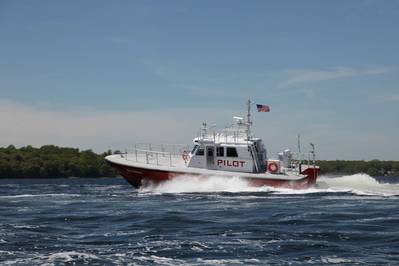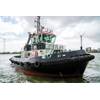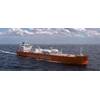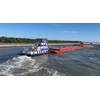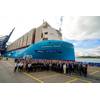Gladding-Hearn Delivers New Launch to Virginia Pilots
The Virginia Pilot Association has taken delivery of a Chesapeake Class MK II launch from Gladding-Hearn Shipbuilding, its ninth pilot boat built by the Somerset, Mass., shipyard since 1983.
The Virginia pilots’ new launch Richmond incorporates the performance benefits of Volvo Penta’s IPS three-pod system and Humphree interceptors. “The combination of the Volvo Penta IPS system and the Humphree interceptors produces lower sound levels and improved comfort and higher speed, while burning about 25 percent less fuel,” explained Peter Duclos, the shipyard’s president.
With a deep-V hull designed by Ray Hunt Design, the new all-aluminum launch measures 55.10’ overall, with a 17.2’ beam and a 4.11’ draft. Powered by twin Volvo Penta D13-700, EPA Tier 3 certified diesel engines, each producing 700 Bhp at 2,250 rpm, the vessel’s top speed is over 33 knots. The interior sound level is 68 dBA at 28 knots.
Each engine is connected to an IPS-3 propulsion pod, fitted with dual forward-facing, counter-rotating propellers and integrated exhaust system, and Volvo Penta’s integrated EVC electronic steering and control system. A Humphree interceptor trim control system, with its Automatic Trim Optimization, Automatic List Control, and Coordinated Turn Control functions are installed at the transom.
The vessel’s wheelhouse is well aft of amidships on a flush deck to improve comfort and provide for a larger foredeck. The aft deck has a large engine removal hatch made possible by the compact Volvo Penta IPS system. The wheelhouse is outfitted with five NorSap shock-mitigating reclining seats, a 12kW Alaska Diesel generator for electricity and a 16,000 Btu reverse-cycle HVAC unit. A second 16,000 Btu HVAC unit is installed in the forecastle, along with a settee berth, enclosed head, small galley and lockers.
Outside of the wheelhouse are heated side-decks and handrails to prevent ice accumulation. Ladders on the sides of the wheelhouse lead to hinged boarding platforms on the roof. A control station is located at the transom, along with a winch-operated rotating davit system over a recessed platform for pilot rescue operations.
Since the Chesapeake Class pilot boat was introduced by Gladding-Hearn in 2003, 22 boats have been delivered to 11 pilot associations throughout the U.S.
In 2018, MarineLink rode aboard Hampton Roads, another Chesapeake Class MK II launch built by Gladding-Hearn for the Virginia Pilot Association. See the vessel in action below.


